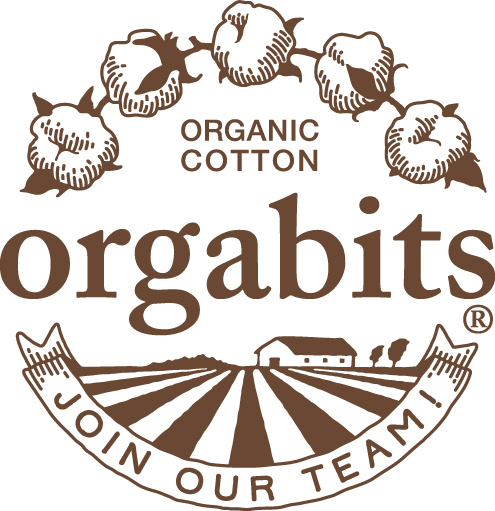
Orgabits Logo
[Summary of survey results]
■Organic cotton is widely known!
・64.2% of respondents know about organic cotton. found to be widely known.
・Most of the organic cotton products used include clothes, underwear/undergarments, towels, and baby clothes. Many people choose organic cotton for things that come in direct contact with their skin.
■The organic image gives a good impression! Also, organic products are very popular!
・73% of people recognize that organic food is good for the environment. Many people understand the meaning of organic.
・About 70% of people have an image of organic products that are good for their bodies and of good quality.
・About 80% answered that they use organic products. Organic products are very popular.
・Many people choose organic products considering the environment.
・Approximately 50% of the total choose organic products that are good for the body and the environment, even if they are a little more expensive.
■Interest in social contribution activities such as environmental conservation and volunteer activities is increasing!
・About 70% of respondents answered that they “participate” in social contribution activities. Very high awareness of participation in social contribution activities.
・Even those who have never participated in social contribution activities, 88.9% answered that they would like to participate. Also, is there a reality that you want to participate but can't participate, such as "I don't have time" or "I don't have the opportunity"? !
■Others
・35.4% of respondents spent ¥2,000 to ¥5,000 on monthly clothes.
[Summary]
As 64.2% of respondents answered that they know about organic cotton, it has become widely known to the public. In addition, 73% of people perceive the word “organic” as being good for the environment, and many people also have the image that it is good for the body and of good quality. In addition, there are many people who are interested in organic products, and many people use products on a regular basis, indicating that organic products are becoming more popular. On the other hand, many people actually participate in social contribution activities such as environmental conservation and volunteer activities, and it is thought that such heightened awareness of environmental and social issues is leading to the selection of organic products. increase. Approximately 50% of the respondents answered that they would choose organic products that are good for the body and the environment even if they cost a little more, so organic products are likely to continue to attract attention.
Based on the above results, it is predicted that more and more people will continue to choose eco-friendly organic cotton and organic products.
[What is the “Orgabits Project” developed by Toyoshima & Co., Ltd., Ltd.? ]
Orgabits is an organic cotton spread project in which the largest number of apparel brands in Japan participates. Currently about 70 brands are participating in the "reversal idea" of delivering 100% organic cotton products to 100 times more people, and about 1 million items are produced annually. The activity has expanded to support farmers in the country of origin and NPO corporations, and the circle is expanding as a social contribution activity that allows you to participate in fashion through one piece of clothing.
About 15% of the pesticides and 7% of the pesticides used in the world are used on cotton produced by conventional cultivation methods (*source: Textile Exchange), which causes soil pollution and environmental problems. It contains various problems such as Organic cotton, on the other hand, refers to cotton grown organically on farmland that has not used pesticides or chemical fertilizers for three years or more. As the demand for organic cotton increases, it is expected that cotton cultivation using conventional cultivation methods will decrease and the above problems will be improved.
This project won the 2013 Good Design Award (Business Innovation, Business Model Category). In addition, August 29th has been officially registered as a memorial day by the Japan Anniversary Association as "Orgabits Day".
[Details of survey results]
■Organic cotton is widely known!
Q1. Do you know organic cotton? (n = 1,000)
64% of respondents answered that they "know" about organic cotton, indicating that organic cotton is widely recognized.
Q2. Please select the organic cotton product you are using from the options below. (n = 1,000)
About 60% of the products that use organic cotton are clothes, undergarments, towels, and baby clothes. It seems that many people choose organic cotton for things that come into direct contact with the skin.
■The organic image gives a good impression! !
Q3. Did you know that organic is good for the environment? (n = 1,000)
73% of people said they know that organic is better for the environment. It turns out that many people understand the meaning of organic.
Q4. What image comes to your mind when you hear the word organic? (n = 1,000)
Approximately 70% of the respondents had an image of organic products as good for the body and good in quality, which was a very positive impression. However, I also found that 56% of people also have an image that it is expensive.
Q5. Are you interested in organic products? (n = 1,000)
We found that 64.3% of respondents were interested in organic products.
Q6. Do you actually use (or have you used) organic products? (n = 1,000)
82.3% of respondents answered that they use (or have used) organic products, which is extremely high, indicating that organic products are popular and often used on a regular basis.
Q7. Q5 above. I have a question for those who answered "yes". Please select the reason why you actually use organic products from the following. (n = 823)
45% of the respondents answered that it was for the environment, indicating that many people choose organic products in consideration of the environment.
Q8. In the case of similar products, would you choose organic products that are good for your body and the environment even if they cost a little more, or would you choose non-organic products that cost a little less? (n = 1,000)
About 50% of the respondents answered that they would choose organic products that are good for the body and the environment, even if they cost a little more. It turns out that many people are willing to pay for organic products, even if they are a little more expensive.
■ About 70% of all participants participate in social contribution activities! !
Q9. Are you participating in social contribution activities such as environmental conservation and volunteering? (n = 1,000)
68.6% of the respondents answered that they "participate" in social contribution activities, indicating a very high awareness of participation in social contribution activities.
Q10. This is a question for those who answered "No" to Q9 above. Would you like to participate in the future? (n = 314)
Even among those who have never participated in social contribution activities, 88.9% answered that they are willing to participate.
Q11. This is a question for those who answered "No" to Q9 above. Please select the reason for not participating from the following. (n = 314)
Even people who have never participated in social contribution activities have the intention to participate, but the reality is that they want to participate but cannot participate, such as "I don't have time," "I don't have the opportunity," or "I don't know how to participate." It seems that.
■Others
Q12. How much money do you spend on clothes in a month? (n = 1,000)
As for the price of clothes used in a month, 2,000 to 5,000 yen was the most common at 35.4%, followed by 5,000 to 10,000 yen at 29.1%, and 10,000 yen or more at 18.7%.
<Chart>
http://www.atpress.ne.jp/releases/50674/att_50674_1.pdf
[Data source]
Survey method: Internet survey
Survey target: Men and women in their teens to 60s living nationwide
Survey period: August 2014
Survey area: Nationwide
Number of samples: 1,000 samples
Orgabits official website: http://orgabits.com
Orgabits Facebook page: https://www.facebook.com/orgabits









